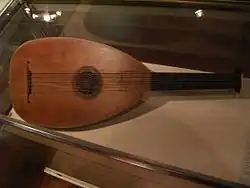лютня
Kazakh
| Alternative scripts | |
|---|---|
| Arabic | ليۋتنيا |
| Cyrillic | лютня |
| Latin | liutnä |
| Yañalif | liutnə |
Etymology
Borrowed from Russian лю́тня (ljútnja), from Polish lutnia, from Czech loutna, from Middle High German lûte, from Italian liuto, from Arabic اَلْعُود (al-ʕūd, “wood”).
Pronunciation
- IPA(key): [ˈlʲʉtʲnʲə]
Declension
declension of лютня
| singular (жекеше) | plural (көпше) | |
|---|---|---|
| nominative (атау септік) | лютня (lütnä) | лютнялар (lütnälar) |
| genitive (ілік септік) | лютняның (lütnänyñ) | лютнялардың (lütnälardyñ) |
| dative (барыс септік) | лютняға (lütnäğa) | лютняларға (lütnälarğa) |
| accusative (табыс септік) | лютняны (lütnäny) | лютняларды (lütnälardy) |
| locative (жатыс септік) | лютняда (lütnäda) | лютняларда (lütnälarda) |
| ablative (шығыс септік) | лютнядан (lütnädan) | лютнялардан (lütnälardan) |
| instrumental (көмектес септік) | лютнямен (lütnämen) | лютнялармен (lütnälarmen) |
Derived terms
- лютняшы (lütnäşy)
Russian
Etymology
Borrowed from Polish lutnia, from Czech loutna, from Middle High German lûte, from Italian liuto, from Arabic اَلْعُود (al-ʕūd, “wood”); see English lute.
Pronunciation
- IPA(key): [ˈlʲʉtʲnʲə]
Noun
лю́тня • (ljútnja) f inan (genitive лю́тни, nominative plural лю́тни, genitive plural лю́тен or лю́тней)
Declension
| singular | plural | |
|---|---|---|
| nominative | лю́тня ljútnja |
лю́тни ljútni |
| genitive | лю́тни ljútni |
лю́тен, лю́тней△ ljúten, ljútnej△ |
| dative | лю́тне ljútne |
лю́тням ljútnjam |
| accusative | лю́тню ljútnju |
лю́тни ljútni |
| instrumental | лю́тней, лю́тнею ljútnej, ljútneju |
лю́тнями ljútnjami |
| prepositional | лю́тне ljútne |
лю́тнях ljútnjax |
△ Irregular.
Related terms
- лютнист (ljutnist)
Ukrainian

лютня
Etymology
Borrowed from Polish lutnia, from Middle Low German lûte, from Italian liuto or Old French leüt, from Arabic اَلْعُود (al-ʕūd, “wood”).[1]
Pronunciation
- IPA(key): [ˈlʲutʲnʲɐ]
(file)
Noun
лю́тня • (ljútnja) f inan (genitive лю́тні, nominative plural лю́тні, genitive plural лю́тень, relational adjective лю́тневий)
Declension
Declension of лю́тня (inan soft fem-form accent-a reduc)
References
- Melnychuk, O. S., editor (1982–2012), “лютня”, in Етимологічний словник української мови [Etymological Dictionary of the Ukrainian Language] (in Ukrainian), Kyiv: Naukova Dumka
Further reading
- Bilodid, I. K., editor (1970–1980), “лютня”, in Словник української мови: в 11 т. [Dictionary of the Ukrainian Language: in 11 vols] (in Ukrainian), Kyiv: Naukova Dumka
- Shyrokov, V. A., editor (2017), “лютня”, in Словник української мови: у 20 т. [Dictionary of the Ukrainian Language: in 20 vols] (in Ukrainian), volumes 8 (л – мішу́рний), Kyiv: Ukrainian Lingua-Information Fund, →ISBN
- “лютня”, in Горох – Словозміна [Horokh – Inflection] (in Ukrainian)
- “лютня”, in Словник.ua [Slovnyk.ua] (in Ukrainian)
This article is issued from Wiktionary. The text is licensed under Creative Commons - Attribution - Sharealike. Additional terms may apply for the media files.